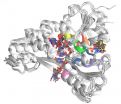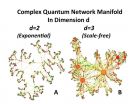"Students were surveyed in the fall, winter and spring of freshman year," said Micere Keels, associate professor in comparative human development at the University of Chicago, who led the study. "At each time-point, approximately 35 percent reported having difficulty paying their bills, being upset that they did not have enough money and being concerned that they would not be able to afford to complete their degree."
The report is the first of a series that will be released from the Minority College Cohort Study, for which Keels is the principal investigator. The study tracks the emerging adult trajectory of Black and Latino college freshmen from five public and private universities in Illinois.
Students who started college with a high level of financial distress fell into one of three groups. The first group is students who enrolled knowing there was an unmet need that would have to be paid for out of pocket, but hoped that somehow they could find a way to pay it before a hold was placed on their account.
The second group is students who enrolled believing there was no unmet need but the final amount of aid received was lower than expected, or made housing or other changes without realizing that it would create unmet need.
The third group is students who, because of limited financial knowledge, believed that financial aid would cover everything and did not budget for living expenses such as food and activity fees. For students without access to any additional credit, from family or banks, incidental expenses add up and lead to stopping-out.
Students in the study entered college in the fall of 2013 and will be followed for six years, regardless of whether they leave college. They were recruited from five Illinois universities: DePaul University, Loyola University, Northern Illinois University, the University of Illinois at Chicago and the University of Illinois at Urbana-Champaign. The report is available on the project's website.
"This project focuses on Black and Latino students because while there has been substantial narrowing of racial and ethnic gaps in college enrollment, there has been no narrowing of the number that matters most--persistence through to degree attainment," Keels said. Consequently, disproportionate numbers of Blacks and Latinos are entering adulthood with college debt but without a degree.
Nationally, approximately 40 percent of Black and 52 percent of Latino freshmen obtain their degree within six years, compared to 63 percent of White and 70 percent of Asian students. Black and Latino students also have significantly more student debt than White and Asian students. For example, approximately 43 percent of Black and 30 percent of Latino graduates have more than $30,500 in student debt, compared to 25 percent of White and 10 percent of Asian students. Consequently, broadening access without increasing persistence disproportionately harms Black and Latino students.
"What we don't know but need to know is the number of students who leave college with debt but without a degree--how many and how much-- and particularly the racial and ethnic gaps in these numbers," Keels said.
The study recommends that universities proactively send out three questions campus-wide to help them quickly identify students in financial distress who are in need of follow-up counseling. The questions cover how much difficulty they are having in paying their bills, how upset or worried they are because they do not have enough money to meet expenses, and how concerned they are that they do not have the finances that will enable them to complete their degrees.
Among the study's key findings:
There was both substantial stability and variability in financial distress across freshman year. Approximately half the students who start freshman year with a high level of financial distress continue through freshman year in this state of high distress. Furthermore, among those who return to college sophomore year, 49 percent are still in this chronic state of high financial distress. Only about a third who start freshman year with a moderate level of financial distress continue to be in that state through freshman year; approximately 40 percent move down to a low level of financial distress and about 30 percent move up to a high level of financial distress.
There are meaningful psychological and emotional benefits to attending college without any student loans. Approximately 27 percent had no federal or private loans but may have had grants or scholarships. These students reported the lowest level of financial distress and depressive symptoms.
Financial distress was significantly associated with depressive symptoms. Twenty-one percent of students who reported a high level of financial distress also reported a high level of depressive symptoms. In contrast, only 3 percent of students who reported a low level of financial distress reported a high level of depressive symptoms.
The pathway from financial distress to lowered psychological and emotional well-being, to lowered likelihood of college success, is complex. The study found that financial distress was significantly associated with a higher level of depressive symptoms, and a higher level of depressive symptoms was significantly associated with lower GPA. Furthermore, depressive symptoms fully mediated the relationship between financial distress and GPA. The direct association between financial distress and GPA became statistically non-significant once the indirect pathway through depressive symptoms was accounted for.
The association between financial distress and an increased likelihood of withdrawing from college may be because financial distress adds to students' uncertainty about whether college will pay off, thereby reducing their commitment to their educational goals. Students with a high level of financial distress were the least likely to endorse the beliefs that college is worth the cost, that getting a college degree will lead to a good paying job, and that they will be able to repay their student loans. The resulting paradox is that students with high levels of financial distress at the start of college--those most reliant on education to enable upward mobility--are also the least likely to believe that obtaining their degree will payoff in the long run.
INFORMATION:
This study was supported in part by a grant from the William T. Grant Foundation.


